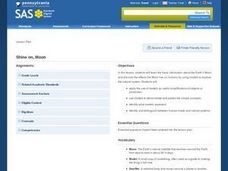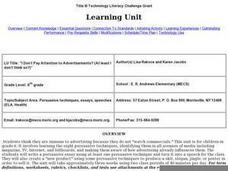Curated OER
Ku Klux Klan
Students discuss, write, and identify symbols of the activities of the Ku Klux Klan in the 1920's in Indiana. In this Ku Klux Klan lesson plan, students also take a field trip to view the Thomas Hart Benton Murals at Indiana University.
Curated OER
A Closer Look at the Klan
Fourth graders learn vocabulary, answer discussion questions, complete writing assignments, and identify symbols connected to the Ku Klux Klan. In this Ku Klux Klan lesson plan, 4th graders also go on a field trip to the Thomas Hart...
Curated OER
Can You Find a Solution?
Students explore the topic of public conservation. In this Florida panthers lesson, students read a scenario about the endangered panther and collaborate to plan a way to protect the panther population. Students also participate in a...
Curated OER
The Stinky Cheese Man and Other Fairly Stupid Tales
Sixth graders demonstrate the ability to process and evaluate content from a variety of sources and apply comprehension skills to the material read. They organize information for practical use and design and develop an informational...
Curated OER
Shine On, Moon
Students explore space science by conducting an experiment in class. In this Moon lesson, students define a list of space science vocabulary and read the book The Moon. Students utilize shoeboxes and string to conduct a sunlight...
Curated OER
I Don't Pay Attention to Advertisements
Sixth graders examine the eight persuasive techniques, identifying them in all avenues of media including magazine, TV, Internet, and billboards, and making them aware of how advertising already influences them. They write an essay using...
Curated OER
"I Don't Pay Attention to Advertisements? (At least I don't think so?)"
Sixth graders study eight persuasive techniques that occur in a variety of media types. They write a persuasive essay and present it to the class. They create a "new product" for which they produce an advertisement using persuasive...
Curated OER
This Land is Your Land? This Land is My Land!
Students research the various territory acquisitions in United States history and create an annotated map that tells the history of U.S. expansion. Working in small groups, students outline the land acquisitions and purchases made by...
Curated OER
Examining newspapers
Students compare and contrast tabloid and broadsheet papers. In this journalism lesson plan, students examine how techniques and form differs from one type of publication to the other. The culminating activity is for students to take...
Curated OER
Growing Seeds
In this science worksheet, students read 5 different scenarios with varied growing conditions for plants. Students make a prediction for each: Will it grow a little, grow a lot, or not grow at all?
Curated OER
Social Studies: Heroes in American Culture
Students examine heroes and discuss their characteristics, values, and actions. They produce Powerpoint presentations on real-life and fictional heroes. Students interview veterans for an oral history project.
Curated OER
Writing a Letter to the Editor
Learners examine the structure and elements of a letter to the editor. They identify letter elements, read and discuss newspaper letters, and write and submit a letter to a local newspaper.
Curated OER
Writing a Letter to the Editor
Students identify the main elements/structure of a letter to the editor. They brainstorm for thoughts and opinions on a specific topic and write a first draft of a letter to an editor of a newspaper. They give each other preliminary...
Curated OER
Objective Versus Subjective
Young scholars examine the difference between subjective and objective statements, newscasts, and media. They discover that subjective is opinion based and objective is fact based.
Curated OER
Find the Question
Students look at a group of statements, and pick out the one statement that is actually a question. For this question lesson plan, students eliminate statements as they read.
Nazareth College
Create Your Own Tornado
Third graders identify key concepts and definitions about tornados. They work in small groups of three to four to create mini-tornados. After reading Tornado Alert as a class, 3rd graders discuss tornados and fill out a KWL chart.
Curated OER
Structure and Support
Eighth graders read copies of The Declaration of Independence, United States constitution, and the Bill of Rights. They write an opinion about the document they feel is most important in the history of the united states. This is their...
Curated OER
Genetics
High schoolers investigate public policy regarding genetic research and have formed an educated opinion on what they believe the government role should be.
Curated OER
History Repeats Itself
Pupils read about an event that occurred 140 years ago to ascertain
information (who? what? when? where? why?) and to compare this event to Rosa Parks arrest almost 50 years ago. They retell the story from your point of view.
Curated OER
Lady of the Sky Amelia Earhart
Eighth graders explore the contributions of Amelia Earhart. In this Amelia Earhart lesson, 8th graders research Internet and print sources to find information about the aviation feats of Amelia Earhart. Students write summaries based on...
Curated OER
Juvenile Delinquency
Ninth graders analyze and interpret historical research by examining, analyzing, and forming opinions regarding primary resources. They compare/contrast social conflict, its causes and effects, in regards to continuity and change over time.
Curated OER
Do We Have to Do This?
Learners conduct Internet research, and read articles about education to determine why particular educational practices are used, and why they are important in terms of No Child Left Behind. Students create PowerPoint presentations...
Curated OER
Debating for Land
Students research pertinent information based on historical facts and is supported by quotations from primary sources in order to prepare for a class debate about land ownership in the 19th century.
Curated OER
Block the Shock Jock or Not?
Pupils examine their own experiences with racist and sexist speech by deciding whether or not they agree or disagree with statements related to this subject. They explore the limits of public speech by reading about the controversy...

























